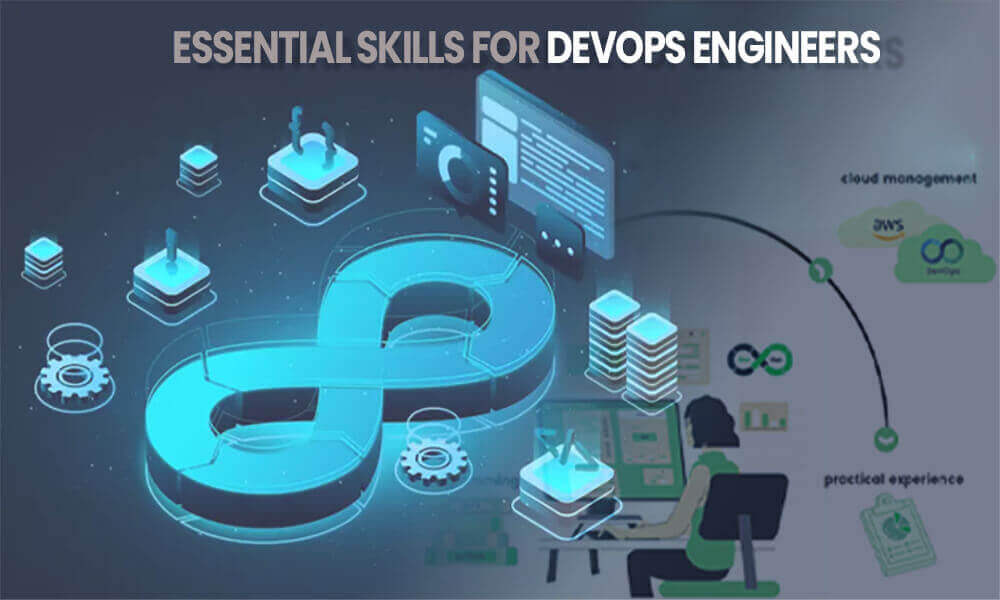Top 5 Essential Skills for DevOps Engineers

DevOps combines the best practices and processes of software development and operations. It has become a fundamental part of the Software Development process and has been adopted by many leading companies. As DevOps continues to become more popular, it has become increasingly important to develop the necessary skills to become a successful DevOps Engineer. The most in-demand IT role for digitally enabled businesses is DevOps engineer. This blog will discuss the five essential skills to become a successful DevOps Engineer.
Who are DevOps Engineers?
DevOps Engineers are software engineers who focus on developing and maintaining applications and systems within an organization. They strive to bridge the gap between software development, operations, and quality assurance to ensure the rapid delivery of high-quality services and products.
They work closely with developers, system administrators, and other IT personnel to ensure the successful implementation of the organization’s IT systems. They are responsible for integrating, automating, monitoring, and deploying applications and procedures and ensuring that the organization’s systems are up-to-date and running smoothly.
DevOps Engineers also help to identify and address performance issues and create and maintain documentation for all systems with the help of IT documentation software. They often use numerous tools, such as version control systems, web servers, and virtual machines, to help implement and manage the organization’s IT systems. DevOps Engineers are skilled in automation and scripting and a number of different programming languages.
The Top 5 Essential Skills Required for DevOps Engineers
Listed below are the top 5 essential skills that a DevOps engineer must possess:
Understanding of Automation
Automation is an essential part of DevOps, as it significantly allows teams to increase efficiency and speed up software delivery. Automated processes can reduce the risk of errors and save valuable time, enhancing overall development productivity. Automation tools such as Ansible, Chef, and Puppet are invaluable for DevOps Engineers. They enable them to quickly and reliably automate complex tasks like infrastructure provisioning, application deployment, and test runs.
Automation also allows for repeatable processes, which ensures that the same code is used for the same task, reducing the risk of errors and making it easier to identify and fix issues. Automated processes also enable teams to quickly scale and respond to changing conditions, making them an invaluable tool for DevOps Engineers.
Knowledge of Cloud Computing
Cloud Computing is a key component of DevOps, providing teams with the tools to quickly and efficiently deploy applications, store data, scale infrastructure, and optimize performance. DevOps Engineers must comprehensively understand Cloud Computing technologies such as AWS and Azure to deploy and manage Cloud applications effectively. They need to have excellent knowledge of the different types of Cloud services, such as Software as a Service (SaaS), Platform as a Service (PaaS), and Infrastructure as a Service (IaaS), and how to use them.
In addition, DevOps Engineers should also be familiar with the different Cloud deployment models, such as public, private, and hybrid Clouds, and how to address issues that arise when deploying applications on the Cloud. As Cloud Computing continues to evolve and new technologies are introduced, DevOps Engineers need to stay updated on the latest developments in the field to take advantage of the new technologies.
Understanding of Containerization
Containerization is a technology within the realm of DevOps that enables teams to quickly and efficiently package and deploy applications. It is an essential tool for DevOps Engineers, who need to understand how to use containerization technologies such as Docker and Kubernetes to manage and deploy applications effectively. They must also be familiar with the various types of containers, such as service containers and infrastructure containers, and how to use them.
In addition, they should be aware of the advantages of containerization, such as reduced resource consumption, improved resource utilization, and more effortless scalability. Containerization can help teams to optimize their processes and provide greater flexibility for their applications.
Knowledge of Monitoring and Logging
Monitoring and logging are integral components of DevOps, enabling teams to identify and rectify problems before they become too serious. DevOps Engineers should be familiar with monitoring and logging tools such as Splunk and Grafana and understand the different types of logs, including application logs, system logs, and security logs.
They must be able to leverage their knowledge to monitor applications effectively and detect potential issues before they become severe. In addition, DevOps Engineers should also be familiar with the best practices for log collection and analysis, as this will help them quickly identify and diagnose any problems that arise. If you are interested and keen on becoming a DevOps Engineer, you can enroll in an advanced software engineering course and enhance your skills to advance your career.
Communication Skills
Communication is an essential skill for DevOps Engineers, as they must effectively collaborate with other team members. DevOps Engineers must possess strong communication skills to communicate ideas, discuss solutions, and provide feedback effectively.
Additionally, they must possess knowledge of various communication tools, such as Slack and JIRA, and understand how to utilize them properly. DevOps Engineers must enable clear lines of communication within the team to ensure that everyone is on the same page and that tasks are completed on time. Additionally, strong communication skills are necessary to ensure that all stakeholders are up-to-date on the project’s progress and that any problems or roadblocks are quickly addressed.
Conclusion
DevOps is rapidly growing, and having the necessary skills to succeed in this field is essential. The five most critical skills for DevOps engineers are:
- An understanding of automation
- Knowledge of Cloud Computing
- Experience in containerization
- Knowledge of monitoring and logging
- Communication skills
A comprehensive understanding of these skills is essential to becoming a successful DevOps engineer. The first step to advancing your DevOps Engineer career is taking a course from a reputed university or institute. For those looking to take an advanced software engineering course, the best software courses online can provide you with the necessary skills to become a successful DevOps Engineer. With the appropriate knowledge and experience, you can become a valuable team member and help drive the development and deployment of high-quality applications and services.










